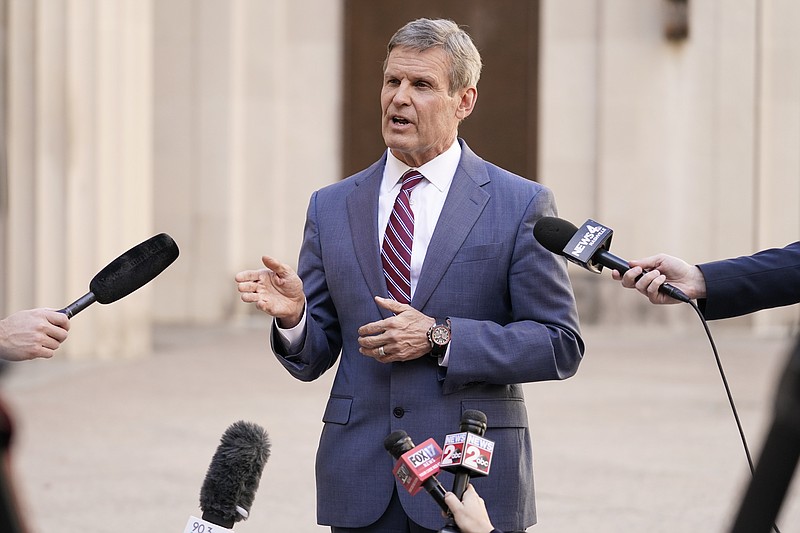Tennessee Gov. Bill Lee is no longer surprised when some of the bills he signs are tabbed "discriminatory" or "narrow-minded" because he knows those words reflect the opinions of only a small number of state residents.
However, he sees legislation on bills involving abortion, transgender athletes, LGBTQ education and vaccine requirements differently.
"I look at them broadly," Lee said in a recent conversation. "I have a responsibility to look at protecting the rights of all Tennesseans, broadly not narrowly."
Take the bills he has signed this year banning transgender athletes from participating in public middle and high school sports where their gender at birth is different from the team on which they want to play, and requiring school districts to alert parents on upcoming instruction on sexual orientation and gender identity and to allow their students to opt out of such instruction.
The transgender athletes bill, Lee said, "provides protection for women in athletics from being discriminated against." Allowing athletes born as male to play on women's teams "would take away protections [women] have enjoyed for decades." For years, he said, the glass ceiling from women's sports has been removed. "We don't need to put that back."
On the bill requiring notification of sexual orientation/gender identify instruction, the governor called the measure "a parental rights bill [for them] to know what their children are being taught. If anyone should have the final word [on controversial topics], a parent should."
Earlier this week, the state House passed a similarly controversial bill, which would require fetal remains from a surgical abortion to be cremated or buried by the medical providers. The mother "has the right to determine" the method and location for the disposition of the remains but does not have to exercise that right. The measure still must be approved by the state Senate before it arrives on Lee's desk.
"I have not fully read the language," the governor said, "so I will have to defer [on saying whether he would sign the bill]. Overall in practice, the idea sounds like something I would support. Until it passes both sides," though, he could not say whether he would sign it.
The criticism about the aforementioned bills is similar to what Lee heard in 2020 when he signed a bill prohibiting abortions once a fetal heartbeat is detected, which can be as early as six weeks into a pregnancy. However, the bill also forbids abortions for gender and race selection. Almost as soon as the bill was signed, lawsuits were filed against it, and its implementation temporarily halted.
Earlier this month, though, the state was heartened when the 6th Circuit Court of Appeals upheld an Ohio law that imposes criminal penalties on doctors who perform abortions on mothers who say a Down syndrome diagnosis is the reason for their procedure.
The bill, wrote Judge Alice Batchelder, "sends a resounding message condemning the practice of selective abortion."
The ruling, said Lee, was "encouraging news. Our bill is similar, but expanded. I'm encouraged about what likely could happen."
He said the same 6th Circuit Court of Appeals - though probably only a panel of it - is set to hear arguments on Tennessee's bill in the next few months.
Lee said he also looks at vaccine requirements in the same light as he does the other bills - with an eye on all state residents, not a select group.
Several measures were discussed in the General Assembly last week about such requirements in schools and their exemptions.
Lee said his opinion on requiring a COVID-19 vaccination in public schools is the same as his opinion on requiring it for all Tennessee residents - it's a personal choice.
He noted on the one hand the vaccines were "developed under emergency use" protocols, and so "are different than vaccines used in the past." But, on the other, he said he has advocated people get vaccinated, made it easier for them to get vaccinated, rolled out public relations campaigns to promote vaccination, and been vaccinated himself.
If a friend who is uncertain about getting a vaccination asks Lee, he said he tells them to "talk to your doctor - your trusted medical voice for any medical question." The choice, he said, should be a "personal decision."
The governor's position on each of these issues is consistent with his conservative Christian, small government, families-first persona.
"I am 100 percent pro-life," he said during his 2018 campaign, "and I will sign any bill that will lead to a decrease in abortions in this state."
Similarly, a 2018 campaign release promised, "Bill will work to preserve our First Amendment religious liberty to ensure Tennesseans are free to exercise their religion free from state and activist overreach."
While critics on the left take their shots at Lee over the legislation, he said "we hear a significant amount of support" from those who strongly back what he is doing.
Either way, the governor said, he is confident what he is doing is "in the best interests of all Tennesseans."
